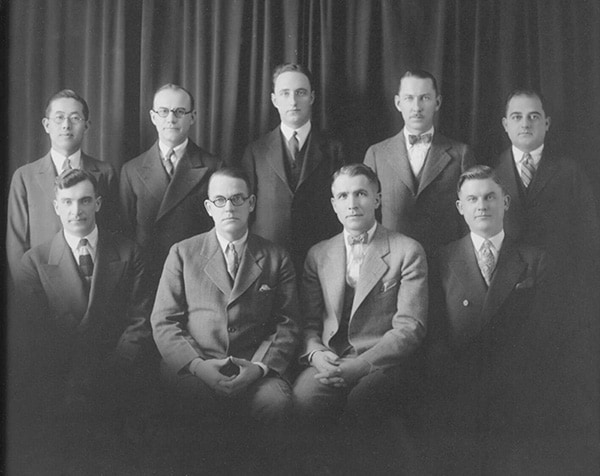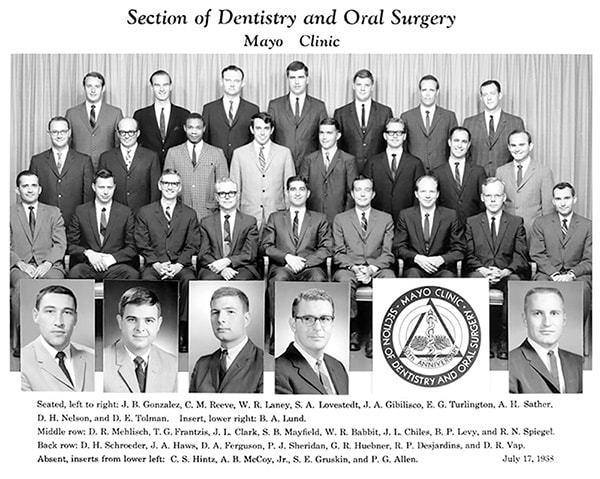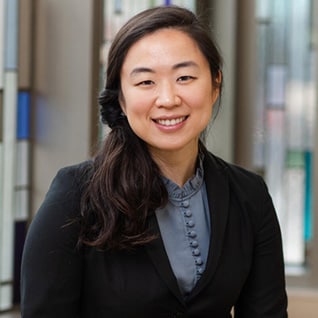Department and Faculty
/prod01/channel_2/media/mccms/content-assets/academics/residencies-and-fellowships/prosthodontics-residency-minnesota/3454173_0027-prosthodontics-res-dept-1024X512.jpg)
The staff of the Department of Dental Specialties at Mayo Clinic's campus in Rochester, Minnesota, provides coordinated care for patients who require specialized dental treatment.
History of the Department of Dental Specialties
 The department is created
The department is created
With more than 100 years of dental specialty care within a medical institution, the history of the department of dental specialties at Mayo Clinic shaped the department it is today.
On October 1st, 1918, Dr. Boyd Gardner (pictured in the front row, center left), formed the section of Dental Surgery at Mayo Clinic.
“We early staff members were most fortunate to have had the privilege of associating with Drs. Will and Charlie for so many years…I am convinced the determination of the brothers Mayo that any physician should be welcome to learn from them was a major factor in the success of the Clinic.”
 Dental programs are formed
Dental programs are formed
Beginning in 1918, special students in dental surgery were admitted to the Mayo Graduate School of Medicine. In 1935, advanced programs in oral surgery became available through the Mayo Graduate School.
By 1966, three additional dental residencies had formed: Orthodontics, Periodontics, and Prosthodontics.
The Prosthodontics residency previously included the Maxillofacial Prosthetics and Dental Oncology fellowship, which became its own program in 2016.
From the program director
Thank you for your interest in the Advanced Prosthodontics Residency at Mayo Clinic.
Prosthodontics is a specialty that I describe as comprehensive, fulfilling, and challenging. It requires not only technical skill, but also strong foundational knowledge, a spirit of collaboration, excellent communication, and out-of-the-box creativity. As prosthodontists, we are given the privilege and responsibility to rehabilitate oral functions and capabilities to enhance an individual’s quality of living.
With the ups and downs in the long road to prosthetic rehabilitation, a fundamental characteristic of a prosthodontist is bravery.
Although there is no "course" on bravery, at Mayo Clinic, we strive to instill this sense of courageousness, willingness to be challenged, and desire to improve. We are committed to bringing out and developing the bravery in our learners such that they can provide their utmost in prosthodontic care.
I encourage you to learn more about our residency and we look forward to meeting you soon!
Sarah Lee, D.D.S., M.S.
Program Director
Faculty
In addition to caring for patients in clinical practice, Mayo Clinic's faculty is committed to teaching and facilitating the growth of medical knowledge. Many of our faculty members have published and lectured extensively and are highly regarded in their fields. You work closely with these individuals throughout your training in the Prosthodontics Residency.
Advisers and mentors
Faculty advisers are available to provide comprehensive educational advice and personal support. You meet with your adviser periodically throughout the program to review your progress and career goals, and ensure that your educational needs are being met. You will choose a mentor to serve as your advocate in academic, clinical and personal areas. Also, your adviser may serve as a contact point for introducing you and your family to Rochester, Minnesota, and the Mayo Clinic system.
Visiting professors
Many prominent professors visit Mayo Clinic each year. They present their work during lectures and have informal discussions with trainees. You are encouraged to take full advantage of these educational opportunities and are relieved from clinical assignments to do so.